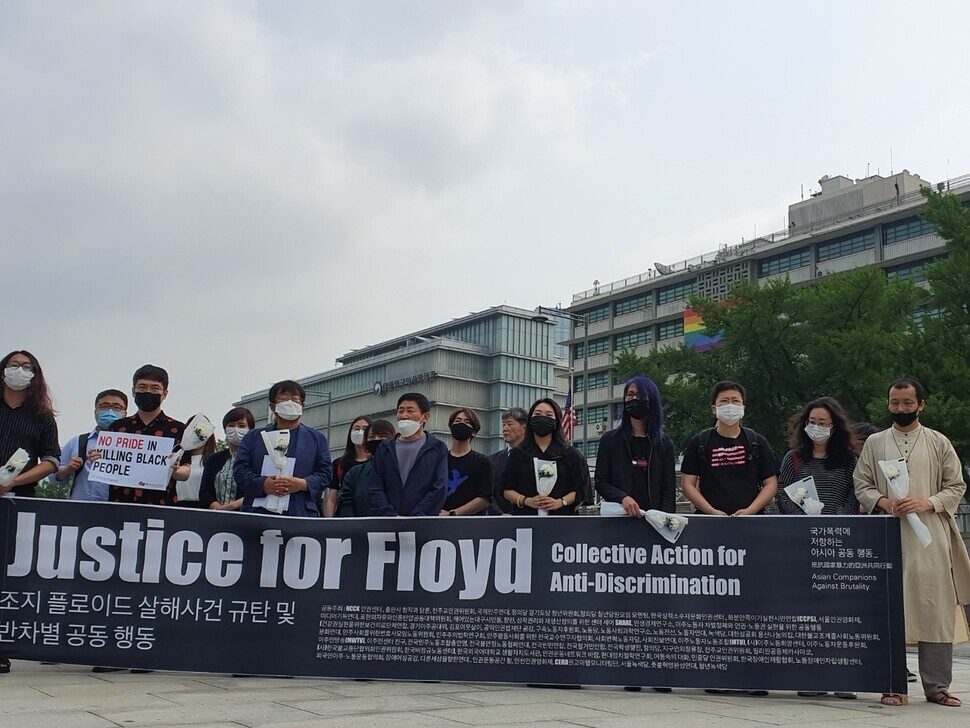hankyoreh
Links to other country sites 다른 나라 사이트 링크
Civic groups call for swift anti-discrimination legislation in S. Korea

As anger over the death of George Floyd due to the excessive use of force by a police officer has been spreading to South Korean society, many have been noting that South Korea has its own issues with discrimination against migrants and ethnic minorities and are calling for swift action to resolve racism issues through anti-discrimination legislation.
A press conference was held in front of the US Embassy in Seoul’s Jongno District on the morning of June 5 by 113 civic groups, including People’s Solidarity for Participatory Democracy and Solidarity for LGBT Human Rights of Korea to remember Floyd and call for stern punishment of the police officer responsible for his death. They went on to stress that “deeply rooted hatred of minority ethnic groups is not a problem in the US alone,” noting that “countless migrant workers and foreign residents suffer from discrimination in South Korea as well.”
In particular, they pointed out how the novel coronavirus pandemic has exposed racial discrimination within South Korean society. Just as different ethnicities in the US have shown different rates of infection and death with the virus, they explained, the coronavirus situation in South Korea has revealed longstanding xenophobia and discriminatory treatment toward migrant workers.
“Undocumented migrants cannot even buy public face masks, while tax-paying migrant workers are not entitled to basic disaster allowances,” explained Udaya Rai, who heads the Migrants’ Trade Union (MTU).
“Migrants have had to face exposure to the virus without any defenses,” he said. Indeed, around 1.44 million of the 1.73 million migrants in South Korea on long-term sojourns as of late March were not eligible to receive disaster relief funds. Meanwhile, discriminatory practices have continued, with some 760,000 people adding their name to a Blue House citizens’ position calling for a ban on arrivals by Chinese nationals early this year when the virus was chiefly spreading around Wuhan, as well as a number of hateful remarks that have been made about Korean-Chinese people and the Daerim neighborhood of Seoul, which is home to a large population of them.
As a first step, the organizers called for establishing societal and institutional foundations for resolving discrimination issues.
“Rather than focusing solely on the safety of overseas Koreans in the US, we need to reflect sincerely on issues of ethnic discrimination within South Korea,” they urged.
“The more than 10-year process of enacting anti-discrimination legislation needs to be completed under the 21st National Assembly,” they insisted.
By Park Yoon-kyung, staff reporter
Please direct comments or questions to [english@hani.co.kr]

Editorial・opinion
![[Column] The state is back — but is it in business? [Column] The state is back — but is it in business?](https://flexible.img.hani.co.kr/flexible/normal/500/300/imgdb/original/2024/0506/8217149564092725.jpg) [Column] The state is back — but is it in business?
[Column] The state is back — but is it in business?![[Column] Life on our Trisolaris [Column] Life on our Trisolaris](https://flexible.img.hani.co.kr/flexible/normal/500/300/imgdb/original/2024/0505/4817148682278544.jpg) [Column] Life on our Trisolaris
[Column] Life on our Trisolaris- [Editorial] Penalties for airing allegations against Korea’s first lady endanger free press
- [Editorial] Yoon must halt procurement of SM-3 interceptor missiles
- [Guest essay] Maybe Korea’s rapid population decline is an opportunity, not a crisis
- [Column] Can Yoon steer diplomacy with Russia, China back on track?
- [Column] Season 2 of special prosecutor probe may be coming to Korea soon
- [Column] Park Geun-hye déjà vu in Yoon Suk-yeol
- [Editorial] New weight of N. Korea’s nuclear threats makes dialogue all the more urgent
- [Guest essay] The real reason Korea’s new right wants to dub Rhee a founding father
Most viewed articles
- 160% of young Koreans see no need to have kids after marriage
- 2New sex-ed guidelines forbid teaching about homosexuality
- 3[Column] Life on our Trisolaris
- 4Presidential office warns of veto in response to opposition passing special counsel probe act
- 5How daycares became the most viable business for the self-employed
- 6Months and months of overdue wages are pushing migrant workers in Korea into debt
- 7OECD upgrades Korea’s growth forecast from 2.2% to 2.6%
- 8Hybe-Ador dispute shines light on pervasive issues behind K-pop’s tidy facade
- 9[Guest essay] Maybe Korea’s rapid population decline is an opportunity, not a crisis
- 10Another chaebol heir caught smuggling liquid marijuana into South Korea